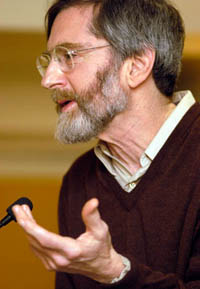 Reincarnation and ghosts are two end-of-life subjects I haven’t touched on much in this column. But Carl Dennis’s “Eternal Life” tackles both in a playful, pondering manner. This also means that he goes back and forth on his views. Initially, he maintains an optimism about the afterlife, but by the end, once he’s factored in everything that it would entail, he decides he’s not too fond of the idea of living on as a ghost. He opens, “An immortal soul, that’s something for me to wish for,/To be off on a long trek after my body’s buried…” (1-2). Rather than staying put, Dennis desires to continue traveling, even beyond death. He doesn’t want to be stuck in one place—not even heaven, and certainly not hell: “Where am I headed? Not downward…For nothing I’ve done seems ripe for eternal punishment. Not upward, for nothing merits eternal bliss” (4, 6-7). I’ve heard many people say that they don’t believe in heaven, but the notion that nobody deserves to go to heaven is something that I’ve never encountered before. Instead, Dennis is content to remain “forever earthbound” (8), watching the seasons repeatedly change. He does, however, admit that it will be no easy task to merely watch things unfold: “It won’t be easy for a being retired from action,/A shadow too weak even to hold open a door…” (11-12). The poet knows that he will get restless in this state, but he doesn’t really mind. The reason for this satisfaction is given later:
Reincarnation and ghosts are two end-of-life subjects I haven’t touched on much in this column. But Carl Dennis’s “Eternal Life” tackles both in a playful, pondering manner. This also means that he goes back and forth on his views. Initially, he maintains an optimism about the afterlife, but by the end, once he’s factored in everything that it would entail, he decides he’s not too fond of the idea of living on as a ghost. He opens, “An immortal soul, that’s something for me to wish for,/To be off on a long trek after my body’s buried…” (1-2). Rather than staying put, Dennis desires to continue traveling, even beyond death. He doesn’t want to be stuck in one place—not even heaven, and certainly not hell: “Where am I headed? Not downward…For nothing I’ve done seems ripe for eternal punishment. Not upward, for nothing merits eternal bliss” (4, 6-7). I’ve heard many people say that they don’t believe in heaven, but the notion that nobody deserves to go to heaven is something that I’ve never encountered before. Instead, Dennis is content to remain “forever earthbound” (8), watching the seasons repeatedly change. He does, however, admit that it will be no easy task to merely watch things unfold: “It won’t be easy for a being retired from action,/A shadow too weak even to hold open a door…” (11-12). The poet knows that he will get restless in this state, but he doesn’t really mind. The reason for this satisfaction is given later:
…When a friend among the living, bearing a tea tray,
Comes to join her guests on the verandah.
The conversation should hold my interest all evening
Even if I can’t participate, my voice too small. (13-16)
Because the conversation is coming from Dennis’s friend, it keeps his interest. He still loves his friends and wants to hear them talk and share their views. As he goes on to explain, when it’s merely strangers talking, he becomes bored; this boredom causes him to “wonder about the joy” (22) he imagined would be his “with death behind [him],/Not looming ahead, and leisure, so scarce before,/Suddenly limitless” (23-25). At this point, he begins to regret his previous longing for death, because his now “limitless” leisure doesn’t always involve the fun he had envisioned.
Even the thought of his friends eventually joining him as ghosts doesn’t cheer Dennis. As he puts it, their ghosts are “vague” (26) when compared “with the living originals” (27) and their “particular lusters” (27). Nothing will ever be quite as good as life itself in Dennis’s version of the afterlife, and he finally acknowledges this. When the writer elaborates on this point, he begins to wonder if maybe he’s wrong, and if reincarnation does exist:
But how can ghosts swear loyalty to the end
If there is no end for them, only a boundless ocean;
Or does a truth I haven’t a map to now
Wait in my ghostly existence to be discovered? (34-37)
There can be no promise-making, no visions of the future, when time stretches on eternally. With no end in sight, things are very different. This realization leads to another realization: that maybe immortality isn’t the best thing. If Dennis is right, and there is no truth to be discovered, then, in his view, he might as well return to the realm of the living: “No surprise if I’m ferried back,/Oblivious, to be born again in the flesh/Among strangers it will take me years to recognize” (40-42). In theory, living on forever and getting to be around one’s family and friends sounds great, but in actuality, it could mean a lot of pain and disappointment. Therefore, whether death means bidding farewell to loved ones or rejoining mankind as a different person, it’s important that we move on in some way.
*Carl Dennis photo courtesy of this website
Related Reading:
- A review of Carl Dennis’s latest book
- An article on death and how many people want to live forever
Do you believe in reincarnation or ghosts?

 “Eternal Life” by Carl Dennis
“Eternal Life” by Carl Dennis



 First the Wealth Gap, Now the U.S. Has a Growing Health Gap
First the Wealth Gap, Now the U.S. Has a Growing Health Gap
 How to Comfort A Dying Loved One
How to Comfort A Dying Loved One
 Our Annual Seven Holiday Gifts for Someone Who Is Grieving, 2024 Edition
Our Annual Seven Holiday Gifts for Someone Who Is Grieving, 2024 Edition














